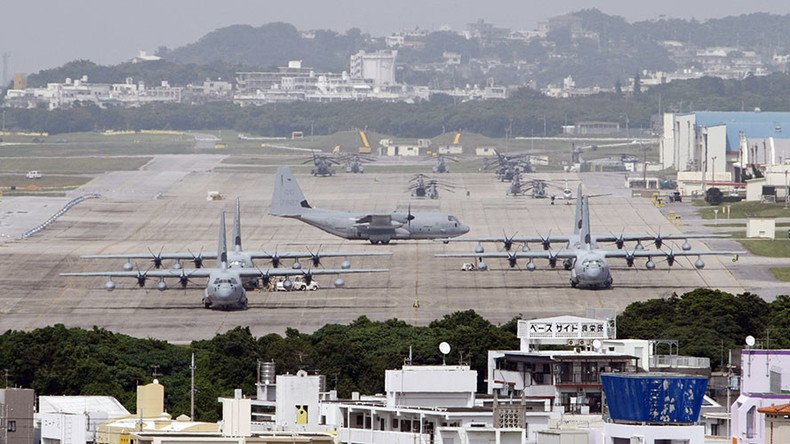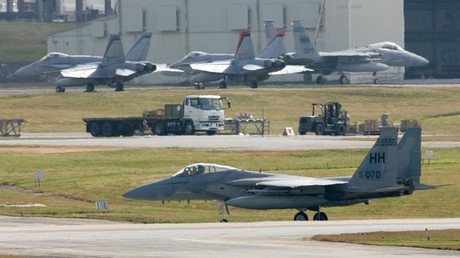Banned chemicals contaminate groundwater near US bases on Okinawa

Elevated levels of two banned pollutants used by the US military have been detected in groundwater running under Marine Corps Air Station Futenma on Okinawa, Japanese officials have said. The Pentagon won’t let Okinawan officials on base to investigate.
The carcinogenics perfluorooctanesulfonic acid (PFOS) and perfluorooctanoic acid (PFOA) were found in high concentrations in underground water during surveys in August and January, the Okinawa prefectural government’s environmental protection department said in a statement.
“High levels of contamination was detected in underground water samples taken from the Oyama and Kiyuna districts,” said Yoshinari Miyahira, team leader of the environmental protection department’s water environments control team. “Both sit on lower grounds adjacent to Futenma.”
Japan banned the manufacture and importation of both chemicals in 2010. They are synthetic, fully fluorinated organic acids that have been linked to tumors, increases in body and organ weight and death in animals, Okinawan officials said. PFOS and PFOA are used in firefighting foam, aircraft grease, water-repellant materials and fluorine chemicals.
Despite the ban, though, the chemicals have been discovered near both Futenma and Kadena Air Base, also on Okinawa. PFOS was found downstream of Kadena last year, leading to the two tests.
In August, three of the 35 locations monitored by Okinawan officials exceeded US drinking water health advisory levels of 0.07 micrograms per liter. The three locations had 1.3, 0.21 and 0.71 micrograms respectively, and were all adjacent to and downstream from Kadena. In January, PFOS was found in six of 41 locations in the prefecture, with levels ranging between 0.11 and 0.88 micrograms.
“The concentration of the substances is notably high in the vicinity of the downstream area of the air station,” Miyahira said. “Meanwhile, samples taken at higher grounds of the air station detected lower levels of the substances.”
Last April, a Freedom of Information Act request by MuckRock revealed a spate of accidents at Futenma over the previous 15 years that spilled at least 21,000 liters of fire extinguishing agents, although not all of the chemicals were deemed hazardous.
It is unclear what caused the current contamination near Futenma. While Okinawan officials are monitoring the situation, they are unable to determine the culprit because the US Marine Corps won’t let them on the air station to investigate, Stars and Stripes reported.
“We have asked the military through the Ministry of Defense to provide us with information on the history of the use of the agents that contained the substances and a trilateral [on-base] survey by the prefectural government, the military and the Ministry of Defense,” Miyahira said, referring to the US Department of Defense. “We received a [ministry] response that the military handles the agents appropriately and that they see no need to conduct the proposed survey.”
Despite the presence of the chemicals in groundwater, water remains safe to drink, according to a spokesman from Ginowan City’s water bureau. The Chatan Water Treatment Plant serves both Kadena and the surrounding areas. The acids also have not appeared in crop samples, Miyahira said.
Air Force switching away from cancer-linked firefighting foamhttps://t.co/Dc4sBymc2spic.twitter.com/wBTjzMtDFq
— RT America (@RT_America) August 19, 2016
Around the same time that PFOS and PFOA were discovered in the groundwater downstream of Kadena, the Air Force announced it would switch to an "environmentally responsible" foam used to extinguish fires because the acids were detected at current and former military bases where firefighting training exercises have been conducted in the US. The chemicals were found in three drinking water systems near Peterson Air Force Base in Colorado Springs, Colorado.
The US military has a long record of contamination from stored or buried hazardous chemicals that have leaked since the island came under American administration at the end of World War II. In June 2015, the Department of Veterans Affairs awarded disability payments to some US veterans who were exposed to the toxic herbicide Agent Orange during the Vietnam War. Two former US service members who were stationed on Okinawa received payments for their exposure in 2012. Futenma served as a forward staging post for the US military during Vietnam.
However, the US government has not compensated Vietnamese citizens who were affected by the poison, or the following generations that are still dealing with the consequences.













